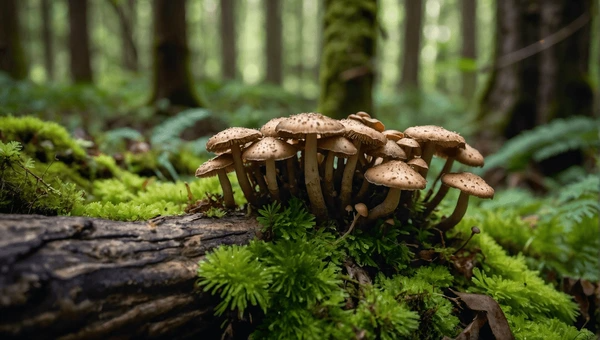Image Credit: Shutterstock
Mushrooms are one of those foods that can transform a meal from ordinary to extraordinary. But just like any perishable food, they can go bad if not handled properly. So, how can you tell if the mushrooms in your fridge are safe to eat or need to be tossed? Whether you’re a mushroom enthusiast or someone who’s just starting to experiment with these versatile fungi, knowing how to spot bad mushrooms is a vital skill.
In this ultimate guide, we’ll walk you through everything you need to know about recognizing spoiled mushrooms and how to keep your meals fresh and safe. We’ll cover the most common signs of bad mushrooms, tips for proper storage, and the health risks associated with eating spoiled mushrooms.
Why It’s Important to Recognize Bad Mushrooms
Before we dive into the details of how to spot bad mushrooms, let’s first understand why it’s crucial to recognize when your mushrooms have gone bad. Eating spoiled mushrooms can lead to food poisoning and other health issues. Mushrooms are particularly sensitive to moisture, temperature, and handling, so if any of these factors go wrong, your mushrooms may spoil much faster than you expect.
Also Read: How to tell your crush you like them
Knowing the signs of bad mushrooms not only helps prevent health risks but also saves you money by ensuring you’re only eating the freshest produce. Plus, it can save you from those unpleasant surprises when you’re preparing dinner.
How Do Mushrooms Spoil?
Mushrooms are highly perishable, and they don’t last long once harvested. Unlike some fruits or vegetables that can last for days or weeks, mushrooms are prone to spoilage due to their high water content and delicate structure. They can spoil in various ways:
- Bacterial Growth: Mushrooms are an ideal breeding ground for bacteria if they’re stored improperly or kept too long.
- Mold Growth: Mushrooms can develop mold if exposed to moisture, which accelerates spoilage.
- Dehydration: On the flip side, mushrooms can dry out and become shriveled if they’re not kept in a proper environment.
Signs That Your Mushrooms Are Bad
Spotting bad mushrooms isn’t as hard as you might think. There are some simple signs to look out for. By checking for these indicators, you can quickly tell if your mushrooms are still fresh or if they’ve passed their prime.
The Look Test: What to Watch For
Visual inspection is one of the easiest ways to spot bad mushrooms. When checking for spoilage, pay attention to the following:
- Discoloration: Fresh mushrooms are usually a consistent color, whether it’s white, brown, or cremini. If you notice any unusual dark patches or spots, it could be a sign that the mushrooms are starting to go bad.
- Wrinkling or Shriveling: Mushrooms that have lost their firmness and appear wrinkled or shrunken are often overripe and past their best.
- Slimy Coating: A slimy or sticky coating on the mushroom caps is another clear sign that they’ve gone bad. Fresh mushrooms should feel smooth and dry to the touch.
The Smell Test: A Key Indicator
The smell is one of the quickest ways to tell if mushrooms are bad. Fresh mushrooms have a mild, earthy smell. If your mushrooms have a sour, rotten, or off-putting odor, that’s a sure sign they’ve gone bad. Trust your nose—if they smell unpleasant, it’s best to discard them.
Texture Trouble: Softness and Sliminess
When mushrooms go bad, they lose their texture. They should feel firm to the touch. If your mushrooms are excessively soft or mushy, they are likely overripe or beginning to decompose. A slimy texture on the surface is a clear indication that your mushrooms are no longer safe to eat.
Color Change: A Bad Sign?
Fresh mushrooms have a consistent color. However, as they spoil, they can begin to change color. A slight browning or darkening is natural in some varieties, like cremini or portobello mushrooms, but if they turn dark black or develop unusual coloring, they may be spoiled. This change usually signals that the mushrooms are starting to rot.
How to Store Mushrooms for Maximum Freshness
To prevent your mushrooms from going bad too quickly, proper storage is essential. Mushrooms should be kept in a cool, dry place, ideally in the fridge. Here are some storage tips to maximize their shelf life:
- Paper Bags Are Your Friend: Avoid storing mushrooms in plastic bags, as they can trap moisture and promote mold growth. Instead, use a paper bag or wrap them in paper towels to keep them dry.
- Don’t Wash Before Storing: Mushrooms absorb water like sponges, so don’t wash them until you’re ready to use them. Moisture will accelerate the spoilage process.
- Use a Ventilated Container: If you’re storing mushrooms in a container, make sure it’s breathable to allow air circulation and prevent moisture buildup.
What Happens if You Eat Spoiled Mushrooms?
Eating spoiled mushrooms can lead to food poisoning. The symptoms of mushroom-related foodborne illnesses can vary depending on the type of contamination but may include nausea, vomiting, diarrhea, and stomach cramps. In some severe cases, it can even lead to foodborne infections requiring medical attention.
To avoid this, always make sure your mushrooms are fresh and properly stored before cooking them.
Can You Eat Mushrooms After They’ve Gone Bad?
While some people might try to salvage bad mushrooms by trimming off the “bad” parts, it’s usually not worth the risk. If the mushrooms are slimy, have a foul smell, or show visible signs of mold, it’s safest to throw them away. Eating spoiled mushrooms, even if they’re only slightly off, could still lead to stomach issues.
Can You Save Mushrooms That Are Slightly Bad?
If your mushrooms are just a little soft or beginning to brown but don’t have any other signs of spoilage, you can try to save them. Simply cut off any discolored or dried-out parts, and cook the mushrooms immediately. Cooking them will kill any bacteria and make them safe to eat. However, if they’re too far gone, it’s better to discard them.
How Long Do Mushrooms Last in the Fridge?
Mushrooms typically last 3-7 days in the fridge, depending on the variety and how fresh they were when you bought them. If you notice them starting to soften, change color, or develop any signs of spoilage before the 7-day mark, it’s time to toss them.
Tips for Buying Fresh Mushrooms
When purchasing mushrooms, choose firm, plump specimens without any visible blemishes or signs of moisture. The gills of the mushroom should be intact, and the cap should be fully formed. Opt for mushrooms from the refrigerated section, as they are likely fresher than those stored at room temperature.
Common Myths About Spoiled Mushrooms
There are several myths about mushrooms that can lead to confusion. For instance, many people believe that mushrooms are poisonous once they’re spoiled, but this isn’t always true. Spoiled mushrooms are more likely to cause food poisoning than poisoning from toxins. Another myth is that you can freeze mushrooms to extend their shelf life—while freezing can work for some types of mushrooms, it’s not ideal for all varieties.
Conclusion: Keeping Your Mushrooms Safe
Now that you know how to spot bad mushrooms, the next step is making sure you store them correctly and use them while they’re fresh. Keep an eye on color, texture, and smell, and always trust your instincts when it comes to food safety.
By following these simple guidelines, you can enjoy fresh, safe mushrooms in your meals without the worry of spoilage.
Also Read: How to tell your crush you like them
Frequently Asked Questions
1. How can I tell if my mushrooms have gone bad?
You can tell if your mushrooms are bad by checking for discoloration, sliminess, an off smell, or a mushy texture. If they show any of these signs, it’s best to discard them.
2. Can you eat mushrooms after they’ve turned brown?
A slight browning in mushrooms is natural, especially for some types. However, if the mushrooms are overly soft, slimy, or have an unpleasant odor, they are likely spoiled and should be thrown away.
3. How long do mushrooms last once opened?
Once opened, mushrooms last around 3-7 days in the fridge, depending on how fresh they were at the time of purchase and how they’re stored.
4. Is it safe to eat slightly soft mushrooms?
Slightly soft mushrooms are still safe to eat if there are no other signs of spoilage. Trim any soft spots and cook them right away to ensure they’re safe.
5. Can you freeze mushrooms?
Yes, you can freeze mushrooms, but keep in mind that freezing can change their texture. It’s best to cook them before freezing for better results.




